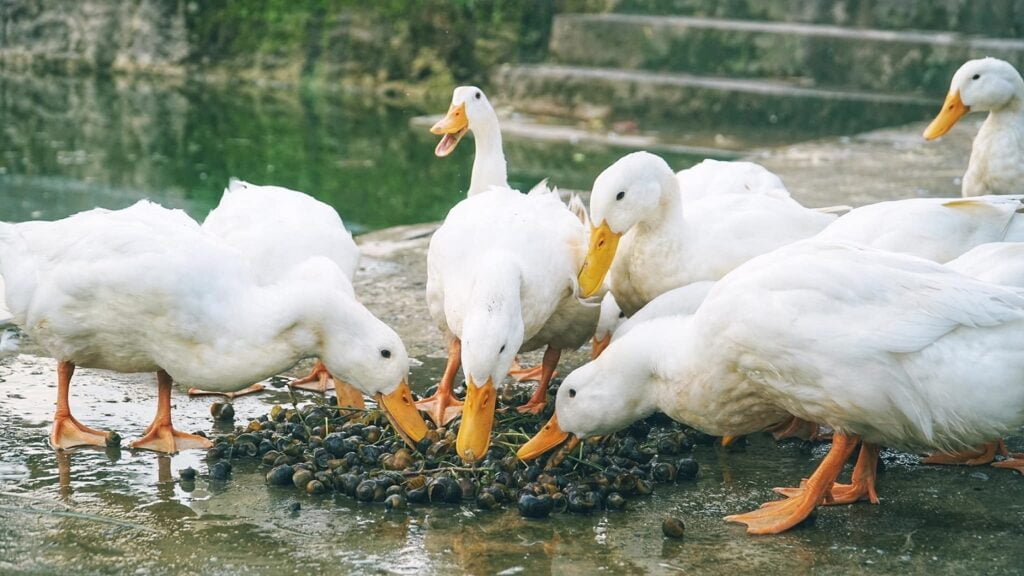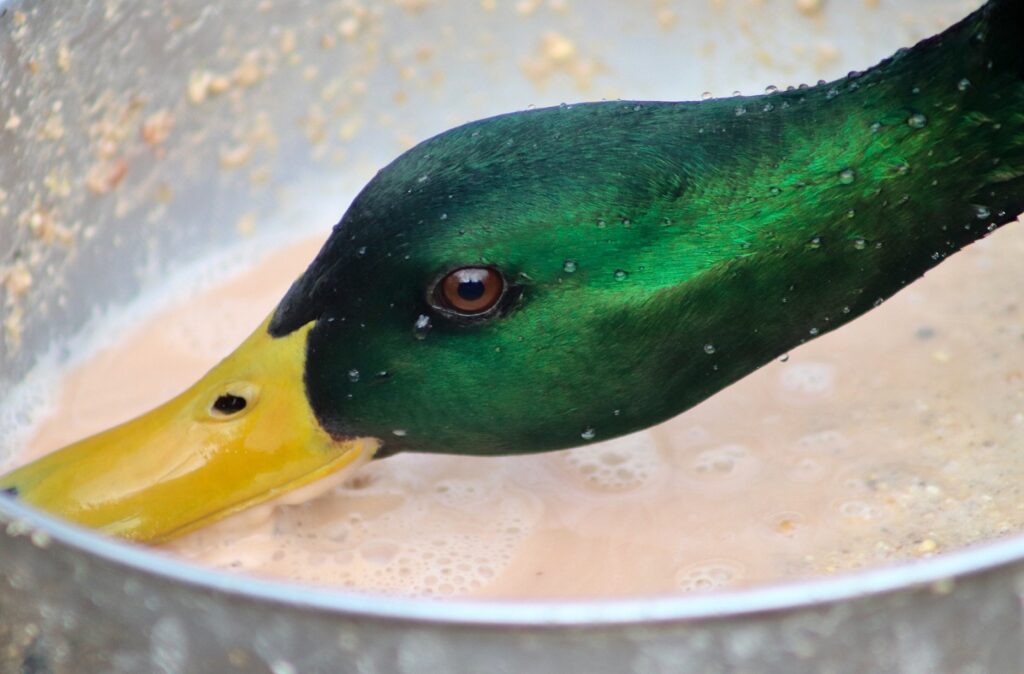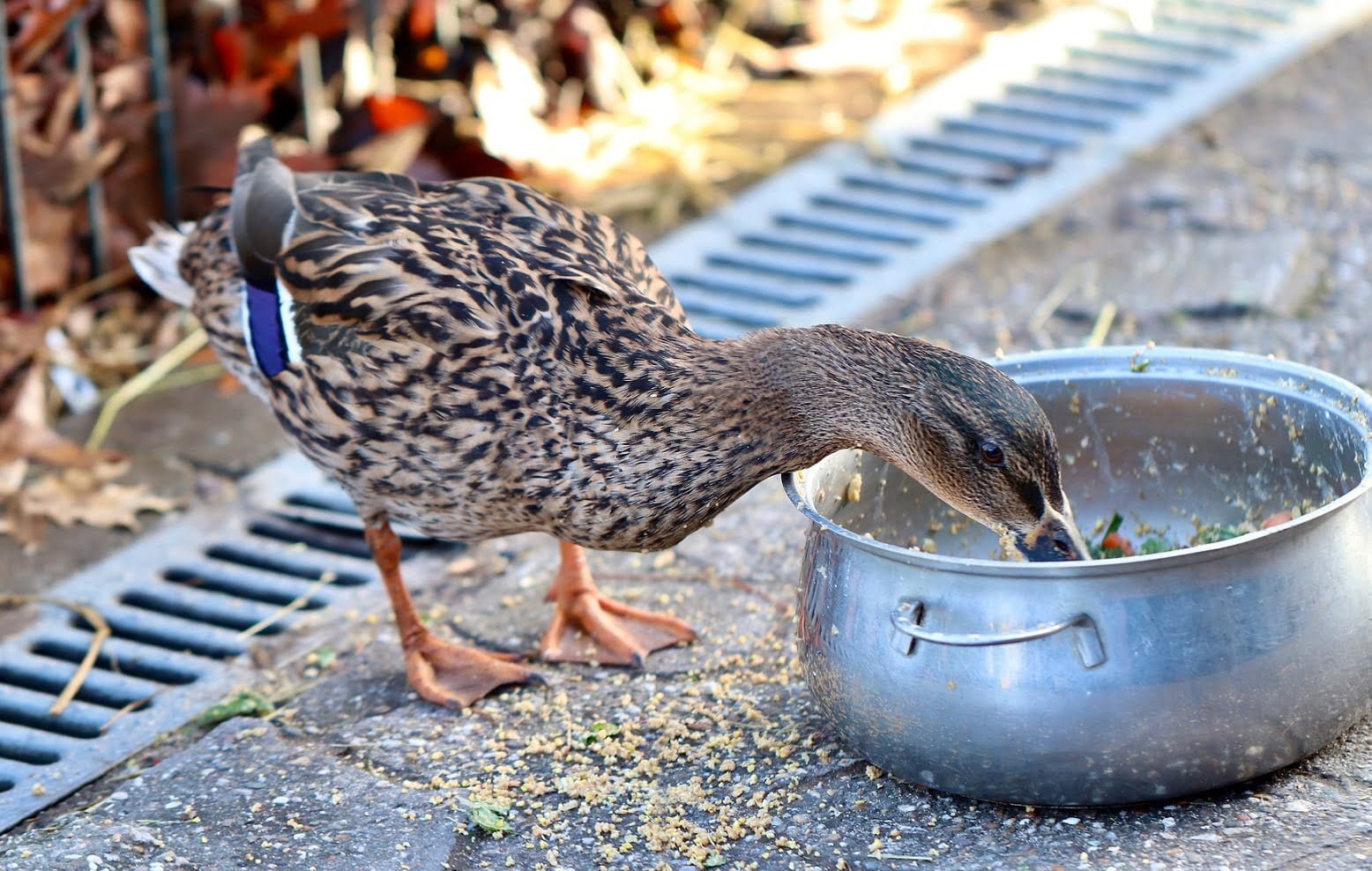Ducks are wonderful animals that have been domesticated by humans for thousands of years. They are commonly raised for their eggs, meat, and feathers. But did you know that the type of feed you give your ducks can have a big impact on their health and productivity?
In this article, we will explore the various types of duck feed and their nutritional benefits.
We will also discuss how to choose the right feed for your ducks and how to feed them properly.
So whether you are a new duck owner or a seasoned pro, read on to learn more about duck feed and how to keep your ducks healthy and happy!
What is Duck Feed and Why is it Important?
Duck feed is a specially formulated feed designed to meet the nutritional needs of ducks at different stages of their life cycle.
It typically contains a balanced blend of essential nutrients, such as protein, carbohydrates, fats, vitamins, and minerals, to support healthy growth, development, and egg production in ducks.
There are many different types of duck feed available, each designed for a specific stage of a duck’s life.
For example, starter feed is designed for young ducks, grower feed is designed for ducks that are growing and developing, layer feed is designed for ducks that are laying eggs, and breeder feed is designed for ducks that are breeding.
The specific composition of duck feed may vary depending on the age, breed, and activity level of the ducks, as well as environmental factors such as temperature and humidity.
It is important to provide ducks with a balanced and appropriate diet to ensure their health and well-being.
Overfeeding or underfeeding can lead to health problems and decreased egg production.
Duck feed is important because it provides the necessary nutrients that ducks need to stay healthy and productive.
A balanced and appropriate diet can help ensure that ducks grow and develop properly, produce high-quality eggs, and maintain good overall health.
It is important to consult with a veterinarian or animal nutritionist to determine the best type and amount of feed for your ducks based on their individual needs and circumstances.
Duck Feed Ingredients and Nutrition
Ducks are omnivores and need a balanced diet to stay healthy.

This table shows the different ingredients found in duck feed, their function, and nutritional information.
By understanding the nutritional needs of ducks, you can choose the best feed to keep them healthy and productive.
| Ingredient | Function | Nutritional Information |
|---|---|---|
| Soybean meal | High-quality source of protein, essential amino acids, and energy | 44-49% protein, 5-7% fat, 2-3% fiber |
| Corn | Good source of carbohydrates and energy | 8-10% protein, 3-5% fat, 2-3% fiber |
| Wheat | Provides carbohydrates, protein, and fiber | 8-13% protein, 1-2% fat, 2-3% fiber |
| Barley | Provides carbohydrates, protein, and fiber | 10-13% protein, 1-2% fat, 2-3% fiber |
| Fish meal | High-quality source of protein, essential amino acids, and omega-3 fatty acids | 55-65% protein, 8-12% fat, 1-3% fiber |
| Alfalfa meal | Provides fiber and protein, as well as essential vitamins and minerals | 15-20% protein, 1-3% fat, 25-30% fiber |
| Calcium carbonate | Provides calcium for strong bones and eggshells | 35-40% calcium |
| Phosphorus | Essential for bone and tissue growth and repair | 0.3-0.5% phosphorus |
| Vitamin A | Essential for vision, immune function, and reproductive health | 3,000-5,000 IU/lb |
| Vitamin D | Essential for calcium absorption and bone health | 500-1,000 IU/lb |
| Vitamin E | Antioxidant that helps protect cells from damage | 20-40 IU/lb |
Please note that the nutritional information provided is approximate and may vary depending on the specific ingredient and source.
What are Duck Feed Pellets?
Duck feed pellets are a popular type of feed for ducks as they are convenient and easy to store.
Pellets are made by compressing the feed ingredients into small, uniform shapes.
They are available in different sizes and can be used for different stages of a duck’s life.
Pelleted feeds offer several advantages. They are less wasteful as the ducks cannot pick and choose their favorite parts of the feed.
They are also easier to store and transport compared to other forms of feed such as crumbles or mash.
Additionally, pelleted feeds are less likely to attract pests and rodents.
What is Organic Duck Feed?
Organic duck feed is a type of feed that is produced without the use of synthetic pesticides, fertilizers, or genetically modified organisms (GMOs).
The ingredients used in organic feeds are typically grown using sustainable farming practices, without the use of harmful chemicals.
Organic duck feed is becoming increasingly popular as consumers become more conscious of the environmental impact of conventional farming practices.
It is also believed that organic feeds may provide additional health benefits to the ducks as they do not contain any harmful chemicals or additives.
When choosing organic duck feed, it is important to look for products that are certified by a recognized organic certification body.
These certifications ensure that the feed meets strict organic standards and has been produced using sustainable and ethical farming practices.
Types of Duck Feed and Their Nutritional Benefits
One of the most important factors in a duck’s diet is the type of feed that it is given.
In this section, we will explore the various types of duck feed and their nutritional benefits.

A. Starter Feed
Starter feed is designed for ducklings that are less than three weeks old.
This type of feed is high in protein and contains all of the necessary vitamins and minerals that growing ducks need.
Starter feed usually contains around 20-22% protein, which is essential for healthy growth and development.
Additionally, it contains vitamins A, D, and E, as well as calcium and phosphorus, which are important for bone growth.
Starter feeds are usually available in a crumbled form to make it easier for the ducklings to eat.
Example Starter Feed Product
- Manna Pro Duck Starter Crumble – This is a non-medicated, organic duck feed that contains 20% protein. It is made with high-quality ingredients, including organic soybean meal and organic wheat.
B. Grower Feed
Grower feed is designed for ducks that are three to six weeks old.
This type of feed has slightly less protein than starter feed, usually around 16-18%.
However, it still contains all of the necessary vitamins and minerals that growing ducks need.
Grower feed also contains added fiber, which helps to regulate digestion and prevent digestive problems.
Example Grower Feed Product
- Kalmbach Feeds All Natural Grower Duck Feed Pellets – This is an all-natural, non-GMO duck feed that contains 16% protein. It is made with a blend of natural grains and is free from artificial preservatives and colors.
C. Layer Feed
Layer feed is designed for adult ducks that are laying eggs.
This type of feed is higher in calcium and protein than other types of feed, usually containing around 16-18% protein and 3-4% calcium.
The extra calcium helps to promote strong eggshells, while the higher protein content helps to keep ducks healthy and productive.
Layer feed usually comes in a pelleted form.
Example Layer Feed Products
- Purina Layena Pellets – This is a calcium-rich, non-medicated layer feed that contains 16% protein and 3.25% calcium. It is formulated with added vitamins and minerals, including vitamin E, to promote healthy egg production.
- Scratch and Peck Feeds Layer Feed – This is an organic, soy-free layer feed that contains 16% protein and 3.4% calcium. It is made with a variety of organic grains and is free from soy, corn, and wheat.
D. Breeder Feed
Breeder feed is designed for adult ducks that are used for breeding.
This type of feed contains a higher amount of protein and fat, which helps to promote healthy breeding and egg production.
Breeder feed also contains added vitamins and minerals, including vitamin E, which helps to promote healthy fertility.
Example Breeder Feed Product
- Nutrena NatureWise Feather Fixer – This is a high-protein, high-fat duck feed that is specifically formulated for breeding ducks. It contains 20% protein and 5.5% fat, as well as added vitamins and minerals to support fertility and egg production.
E. Scratch Feed
Scratch feed is a type of feed that is typically given to ducks as a treat or as a supplement to their regular diet.
Scratch feed usually contains a mixture of grains, such as corn, wheat, and barley.
While scratch feed is not nutritionally balanced, it can provide ducks with additional energy and variety in their diet.
Example Scratch Feed Product
- F.M. Brown’s Encore Gourmet Poultry Scratch – This is a treat-style scratch feed that contains a mixture of grains, including cracked corn, wheat, and milo. It is designed to be fed as a supplement to a regular diet and is not nutritionally balanced.
Note: Specific products mentioned may vary depending on your location and availability. It is always recommended to consult with a veterinarian or animal nutritionist to determine the best feed for your ducks based on their specific needs and health status.
Factors to Consider When Choosing Duck Feed
To ensure that ducks are healthy and productive, it is important to choose the right type of feed that meets their nutritional requirements.
When selecting duck feed, there are several factors that you should consider, including:
Factor 1: Nutritional Requirements
Different stages of a duck’s life require different levels of protein, vitamins, and minerals.
For example, ducklings require high levels of protein to support their rapid growth and development, while adult ducks require a lower protein diet to maintain their body weight.
Therefore, it is important to choose a feed that meets the nutritional requirements of the ducks in each stage of life.
Consult with a veterinarian or a poultry nutritionist to determine the ideal feed for your ducks.
Factor 2: Quality
The quality of the feed is crucial for the ducks’ health and wellbeing.
Poor quality feed can lead to nutrient deficiencies, malnutrition, and health problems.
When selecting feed, choose a reputable brand and look for feeds that have a guaranteed analysis on the label, indicating the nutrient composition of the feed.
It is also important to store feed in a cool, dry place to prevent spoilage.
Factor 3: Cost
The cost of the feed is an important factor to consider, especially for those with large flocks.
However, it is important to note that cheaper feeds may not provide the necessary nutrients required for optimal growth and development.
High-quality feed may cost more, but it can lead to lower veterinary costs and better overall productivity.
It is essential to strike a balance between cost and quality when selecting feed.
Factor 4: Feed Form
Different forms of feed, such as pellets, crumbles, and mash, are available.
Pellets are convenient and easy to store, but ducks may prefer crumbles or mash.
It is important to choose a form that the ducks will eat readily.
Consider offering a variety of feed forms to determine which one is preferred by your ducks.
Factor 5: Organic vs. Conventional
Organic feeds may be more expensive than conventional feeds, but they offer several benefits such as sustainability, ethical farming practices, and potentially better health for the ducks.
Organic feeds are made from natural ingredients and do not contain artificial colors, flavors, or preservatives.
However, it is important to note that not all organic feeds are created equal, and it is important to choose organic feeds from reputable brands.
In conclusion, selecting the right type of feed is essential for the health and productivity of ducks. There are many factors to consider when choosing duck feed, such as the nutritional requirements, quality, cost, feed form, and organic vs. conventional options. It is important to consult with a veterinarian or poultry nutritionist to ensure that you are providing your ducks with the ideal feed for their needs.
Duck Feed FAQs
This FAQs will answer some of the most common questions about duck feed, including:

Q: What kind of food do ducks eat in the wild?
In the wild, ducks eat a variety of foods including insects, crustaceans, mollusks, aquatic plants, and small fish. They also graze on land for seeds and grains.
Q: Can ducks eat bread?
While bread is not toxic to ducks, it is not a healthy food for them. Bread lacks the nutrients that ducks need, and it can also cause health problems such as malnutrition and digestive issues.
Q: What are the best foods to feed ducks?
The best foods to feed ducks are those that mimic their natural diet. This includes a variety of grains such as cracked corn, wheat, barley, and oats, as well as protein-rich foods like mealworms, earthworms, and cooked eggs. Vegetables such as peas, lettuce, and carrots can also be included in their diet.
Q: How much should I feed my ducks?
The amount of food you should feed your ducks depends on their size and activity level. As a general rule, ducks should be fed twice a day, with an amount of food that they can consume in 15-20 minutes. Overfeeding can lead to obesity and health problems, so it’s important to monitor their food intake.
Q: Can ducks eat chicken feed?
While chicken feed contains many of the same nutrients as duck feed, it may not be formulated specifically for ducks and may not meet their nutritional needs. It is recommended to use a feed that is formulated specifically for ducks.
Q: Can ducks eat dog food?
Dog food is not recommended for ducks as it may not meet their nutritional needs and may contain ingredients that are harmful to them. It’s best to stick with a feed that is specifically designed for ducks.
Q: What are the risks of feeding ducks?
Feeding ducks can lead to a number of problems, including overpopulation, the spread of disease, and environmental damage. It’s important to feed ducks in moderation and to choose healthy foods that meet their nutritional needs.
Q: Can ducks eat rice?
Yes, ducks can eat rice, but it should be cooked and offered in moderation as a treat. Raw rice can be harmful to ducks as it can expand in their stomachs and cause digestive problems.
Q: How long does duck feed last?
The shelf life of duck feed varies depending on the type of feed and storage conditions. Typically, duck feed can last up to six months if stored in a cool, dry place in an airtight container.
Q: How much does duck feed cost?
The cost of duck feed varies depending on the brand, type, and quantity. Generally, a bag of duck feed can range from $10 to $30 or more, depending on the size and quality of the feed.
Q: What will happen if duck eats an expired feed?
If a duck eats an expired feed, it may become sick or develop digestive problems. Expired feed can contain harmful bacteria or toxins that can cause illness or even death in ducks. It’s important to check the expiration date on the feed and discard any expired or moldy feed to ensure the health and well-being of your ducks. If you suspect that your duck has eaten expired feed or is showing signs of illness, it’s best to contact a veterinarian for guidance.
Q: How can I know if a duck is sick or has digestive problems?
There are several signs that can indicate if a duck is sick or has digestive problems:
1. Changes in appetite – If a duck is not eating or drinking as much as usual, it may be a sign that it’s not feeling well or has digestive problems.
2. Changes in behavior – If a duck is lethargic, inactive, or isolating itself from other ducks, it may be a sign of illness or digestive problems.
3. Diarrhea – Loose, watery droppings or diarrhea can be a sign of digestive problems or illness.
4. Abnormal droppings – If a duck’s droppings are discolored, have an unusual odor, or have an unusual texture, it may be a sign of digestive problems or illness.
5. Respiratory problems – If a duck is coughing, sneezing, or having difficulty breathing, it may be a sign of respiratory problems or illness.
If you notice any of these signs in your ducks, it’s important to seek veterinary care as soon as possible. A poultry specialist or a veterinarian can perform a physical exam, diagnose the problem, and provide treatment recommendations to help your ducks recover.
Importance of a Balanced Diet for Ducks
Ducks need a balanced and nutritious diet to stay healthy and productive.
Choosing the right type of feed for your ducks at each stage of their life can help to ensure that they get all of the necessary vitamins, minerals, and nutrients that they need.
Whether you are raising ducks for their eggs, meat, or simply as pets, taking the time to understand their nutritional needs and providing them with the right feed can help to keep them happy, healthy, and thriving.
Also Read: The Complete Guide to Love Bird Care and Maintenance
Well, what do you think about the article?
Did you enjoy reading “Duck Feed – Meeting the Nutritional Needs of Your Flock“? If so, please comment down below. We would love to hear your thoughts about this comprehensive guide.
To see more content like this check the guides section of Money For My Beer.

Chief Editor and Website Owner.
Hey, I’m Ryan, a software guy and the owner of Money For My Beer. I’m the one making sure all our posts on the site are awesome.
I usually handle tech stuff that might not be super interesting to everyone, like programming enterprise software, apps, games, and websites. Cool stuff, right? I also help clients with SEO and sometimes create games.

